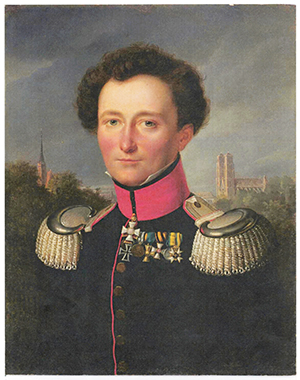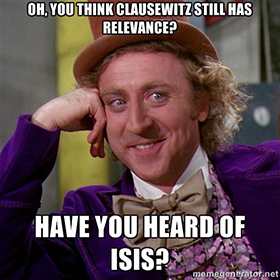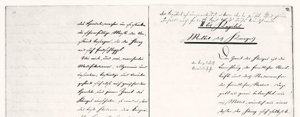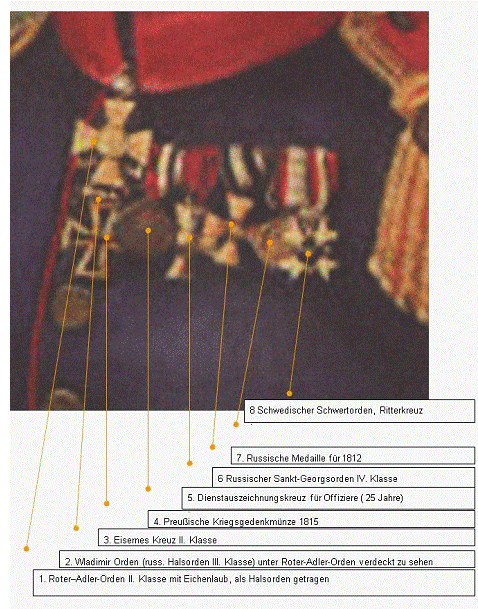
THE CLAUSEWITZ STUDIES NEWSLETTER
VOL I: No.1 - No.2 - No.3 - No.4 - No.5 - No.6 - No.7 - No.8 - No.9
VOL II: No.1 - No.2 - No.3 - No.4 - No.5 - No.6 - No.7 - No.8 - No.9
Welcome to all subscribers of The Clausewitz Studies Newsletter! We hope you will enjoy this new initiative, which focuses on articles and news concerning the great Prussian's legacy.
 Two hundred years ago, Carl von Clausewitz began writing his seminal treatise, On War. It was 1816 and the seemingly endless Napoleonic Wars were finally over. Now stationed in Coblenz, Clausewitz served as chief-of-staff for the General Command of the Rhine (later renamed VIII Prussian Corps). At last he had the time to work on a long contemplated project, a complex book studying changes in warfare and laying out the basics of strategy.
Two hundred years ago, Carl von Clausewitz began writing his seminal treatise, On War. It was 1816 and the seemingly endless Napoleonic Wars were finally over. Now stationed in Coblenz, Clausewitz served as chief-of-staff for the General Command of the Rhine (later renamed VIII Prussian Corps). At last he had the time to work on a long contemplated project, a complex book studying changes in warfare and laying out the basics of strategy.
Our ambitions are much smaller. Once per month, we would like to exchange information, shar interesting texts, and hopefully foster a community of readers genuinely curious about Clausewitz's work and legacy.
CONTENTS
In this inaugural issue of The Clausewitz Studies Newsletter:
• What we found interesting: Articles, News, and Podcasts
• Old but Good: From the copious bibliographies of ClausewitzStudies.org
• What is ... doing?: Some Clausewitz scholars and their work
What we found interesting
Craig Beutel, a veteran Australian officer, wrote a short but illuminating essay on "center of gravity" and its relevance to modern strategy and military operations (link). Be prepared to learn about 18th century physics, but—more relevant to our time—should we stop thinking about COG as a “thing,” and did Clausewitz actually have two different concepts for COG?
ALSO:
• Christopher Daase and James W. Davis’s book Clausewitz on Small Wars is out. Here are some reviews: Artemis Photiadou for LSE Review of Books (link); Simon Tyler for E-International Relations (link); Sibylle Scheipers for Small Wars & Insurgencies (link, Paywall).
• “Wars are fought twice: once on the ground and once in the mind,” writes Olivia Garard in “Uniqueness as Flexibility: Refining Strategic Narrative” for The Strategy Bridge (link). The essay discusses the need to develop, next to a military strategy itself, also a strategic narrative, if a conflict is to be won. Garard points out that “Clausewitz never forgets that wars are fought both physically and morally.”
• William Pietersen, Professor of the Practice of Management at Columbia Business School, wrote an interesting article about On War and its lessons for modern business strategists (link). Side note: When using the surname alone, it's Clausewitz, not "von Clausewitz": the "von" is a designator of noble status, the so-called Adelsprädikat, but according to the German laguage standard it is unnecessary when only the family name is used. This is really a minor issue, but an annoying one.
• The Münster University and State Library continues with the digitalization of Marie and Carl von Clausewitz's papers held in its vaults. Marie's diary from 1813, her notebook from 1832-1836, and some of Carl's poetry have already been published online (link). We hope to introduce more digitalized content in our next newsletter in May.
• Have you ever wondered what are the military decorations featured on Clausewitz’s chest in the famous portrait by Wilhelm Wach? Dr. Rolf-Reiner Zube and Olaf Thiel from the Clausewitz Society in Burg bei Magdeburg (Forschungsgemeine Clausewitz) have the answer. You can read the complete list of Clausewitz’s military decorations here (link). Surprise: two of them don’t appear on the Wach portrait.
• We are big fans of The DeadPrussian Podcast. Vanya E. Bellinger was even featured in one of its episodes. Mick Cook talks with historians, military professionals, and civilian writers about military theory, strategic thought and current conflicts. Don’t be intimidated—The DeadPrussian is an accessible, smart, informative and sometimes highly entertaining show.
• Speaking of podcasts, you can listen to Vanya Bellinger’s lecture at the Pritzker Military Museum and Library (link). Also on Pritzker Presents you can find Donald Stoker’s 2014 lecture on Clausewitz the soldier (link, Paywall/Membership Fee). Another video of Stoker, speaking to Google about Clausewitz on 17 NOV 2014, is free on YouTube.
• Jill S.Russel wrote a very personal blogpost on why Marie von Clausewitz’s experience matters (link). Here is her review of Marie von Clausewitz: The Woman behind the Making of On War in H-Net (link).
• What do Marie von Clausewitz and Col John Boyd have in common? More than you think, according to the ZenPundit Blog (link).
Old but Good
Did you know that ClausewitzStudies.org offers exhaustive bibliographies of books, monographs, articles, etc., on the military theorist's life and legacy, in many different languages?
 In this section, we will highlight an interesting text we think is related to current debate.
In this section, we will highlight an interesting text we think is related to current debate.
We stumbled upon this meme in Twitter (on the left or above) and immediately thought that Captain (USMC) Brett Friedman’s essay “Clausewitz and Comprehensive Counterinsurgency” from 2014 (link) would be a good answer to it. A broader response to the 'New Wars' fallacious portrayal of Clausewitz is Bart Schuurman's critique in "Clausewitz and the 'New Wars' Scholars," Parameters, Spring 2010, pp.89-100
Plus, we are excited about Brett’s upcoming book, On Tactics: A Theory of Victory in Battle.
For supplementary reading, consider Sebastian Kaempf’s “Lost through non-translation: bringing Clausewitz's writings on ‘new wars’ back in” from 2011 (link, Paywall).
What is Bruno Colson doing?
Let us introduce you to some of the 'movers and shakers' in Clausewitz scholarship.
 For our inaugural edition we chose Bruno Colson, professor at the Universite de Namur, Belgium. His book Napoleon: On War is a meticulous study of the French emperor’s thinking on war and strategy. It is translated from the French Napoleon: De La Guerre. In his ground-breaking research, Professor Colson gathered Napoleon’s musings spread out in correspondences and other writings, and then compared them with Clausewitz’s seminal treatise, On War. See also Bruno's review essay "Clausewitz for Every War" (2011). For a list of his publications on Clausewitz, see English - French.
For our inaugural edition we chose Bruno Colson, professor at the Universite de Namur, Belgium. His book Napoleon: On War is a meticulous study of the French emperor’s thinking on war and strategy. It is translated from the French Napoleon: De La Guerre. In his ground-breaking research, Professor Colson gathered Napoleon’s musings spread out in correspondences and other writings, and then compared them with Clausewitz’s seminal treatise, On War. See also Bruno's review essay "Clausewitz for Every War" (2011). For a list of his publications on Clausewitz, see English - French.
Professor Colson was kind enough to interrupt his spring break and sent us an update about his recent projects: “For the 200th anniversary of the Waterloo campaign in 2015, I was especially looking at what Clausewitz did as the chief of staff of the III Prussian Army Corps. I presented a [paper] "Clausewitz's Waterloo Campaign" at a conference in Oxford last September in honor of Sir Hew Strachan,” he wrote in an email. (Clausewitz own study of The Campaign of 1815 can be found in English here and in German here.}
Recently, Professor Colson finished the French manuscript of his biography of Clausewitz, which is due to be published in September 2016 [Éditions Perrin, ISBNs: 2-262-03838-4, 978-2-262-03838-0]. “There will be much more in it about Clausewitz's role in 1815. We are in the process of re-reading and improving the language, which also takes some time, as the work is, of course, mainly based on translations from German sources.”

Panorama
English is the language the majority of us speak, and German is the 'default language' of Clausewitz studies. Yet articles, monographs and books on Clausewitz and On War are published in many other languages. We would like to present to you some of the most interesting non-English and non-German texts. See also ClausewitzStudies.org's bibliography of works in 'other' languages.
Аргументы и факты, a popular Russian newspaper, published an exposé on “Famous foreigners who once served in the Russian military” (link, Russian). As АиФ points out, Clausewitz fought in the Patriotic War of 1812 (Отечественнaя война), as Napoleon’s Russian Campaign is known there. He participated in at least two of its great battles—Vitebsk and Borodino. “Not knowing the Russian language, Clausewitz could not command a military unit, therefore in battles he participated as a common soldier, with a saber in the hand,“ writes АиФ.
Interestingly, the long list of foreigners serving in the Russian military also features a a familiar hero from the American Revolutionary War. John Paul Jones is widely known today as the “Father of the American Navy,” but in 1788 Catherine the Great commissioned him as a Russian rear-admiral, but with the Russian name “Pavel” so he could keep his American citizenship.
Clausewitz’s service under Tsar Alexander I remains a largely understudied subject and we hope to offer you more on it soon.
P.S. If you have an interesting article in mind, please send us a link, plus a short description if it is written in a language other than English, German, Russian, or Bulgarian. (Vanya's French works only for 1-2 page article.)
Bulletin Board
This is our very first issue and therefore we are don't have any announcements in this section. If you have information, translations, contacts, or anything else related to Clausewitz and Clausewitz scholarship, drop us a line and we will spread the word.
Let us know what you think about this newsletter! Be gentle, we are just starting. And send us anything you find relevant, interesting and newsworthy.
Until May, Happy Reading!
|
With warmest regards, Christopher Bassford (Senior Editor) |

